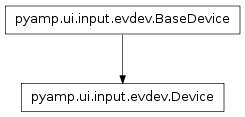The userInput module¶
The userInput module contains the UserInput class which provides the ability to process keyboard presses from a user and call a specific function when certain keys are received.
The Device class¶

- class pyamp.ui.input.userInput.Device(filename)¶
An abstract input device attached to a Linux evdev device node
- poll()¶
Receive and process all available input events
- readMetadata()¶
Read device identity and capabilities via ioctl()
- update_EV_ABS(event)¶
Scale the absolute axis into the range [-1, 1] using absAxisInfo
The UserInput class¶

- class pyamp.ui.input.userInput.UserInput(keyboard, debug=False)[source]¶
The UserInput class uses the amp.ui.input.evdev module to receive the user’s keyboard presses given the specific Linux keyboard device.
This class provides to ability to add a series of callbacks for specific keyboard presses. These functions will be called in the event that the key presses occur.
- keyboard – The Linux keyboard device
- debug – True for debugging mode, False otherwise
- addCode(key, code)[source]¶
Add codes for given key press events. The key can be a tuple where the first index is a list of keys and the second index is a list of modifiers. Or it can be simply a list of keys, or it can be a single key.
- addCodes(keys)[source]¶
Add codes for given key press events. Each key in the keys dictionary can be a tuple where the first index is a list of keys and the second index is a list of modifiers. Or it can be simply a list of keys, or it can be a single key.
- addKey(key, callback)[source]¶
Add a single key to the key press cases. The key can be a tuple where the first argument is the list of keys, or a single key, and the second argument is a list of modifiers. Optionally, is can just be a list of keys, or it can be a single key.
- addKeyList(keys, callback)[source]¶
Add a list of keys mapped to a single function. Keys can be a tuple where the first index the a list of keys, or a single key, and the second index is the list of modifiers. Or it can be a list of keys, and finally it can be just a single key.